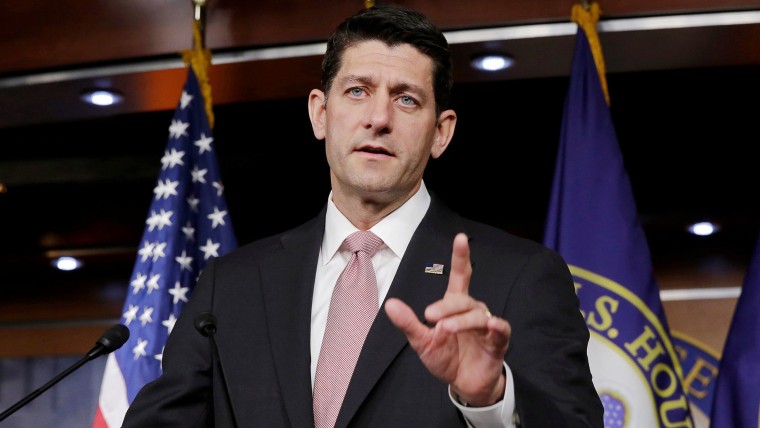The vast majority of Senate Republicans were prepared late last week to pass a health care bill that they hated and didn't want to become law. Asked for an explanation, GOP senators said they were merely going along with a bizarre plan that would get a health care bill to a conference committee -- effectively letting House and Senate negotiators begin the process of writing a new bill.
Left unsaid was a matter of avoiding blame: senators knew that if the House passed a bill and the Senate did not, blame for the initiative's demise would fall on their shoulders, and no one else's.
With that in mind, House leaders are saying largely what we'd expect them to say.
House Speaker Paul Ryan, who spent weeks urging his members to hold their fire and give Senate Republicans some space to get a health care deal, didn't hide his frustration at a closed-door meeting in the Capitol basement on Friday. He effectively threw the Senate under the bus, telling his colleagues that the House of Representatives was the only arm of the government that was working. [...]One House GOP member in the meeting summarized Ryan's remarks as "essentially, we are the functioning chamber. We did our work. This one is on them."
On the surface, this might have some appeal as an argument. The House passed a bill, the Senate didn't, so the House has earned bragging rights as the "functioning" chamber of Congress.
But can we please not forget how Ryan and the House GOP leadership team actually passed their health care plan?
After writing a bill in secret and bypassing legislative hearings, the House Speaker brought his bill to the floor for a vote less than a day after it became publicly available. No one, including House members themselves, had any idea what their bill cost or how many American families would suffer if their legislation was passed into law, because Ryan insisted on holding a vote before the Congressional Budget Office could release a score of the House proposal.
All the while, when GOP leaders weren't hiding the bill, they were brazenly lying about it.
It's against this backdrop that Ryan managed to get his ridiculous legislation through the chamber, despite bipartisan opposition, only to have Donald Trump himself denounce the bill soon after.
If Paul Ryan looks at this as evidence of a "functioning" legislative chamber, perhaps he should raise the bar for success a bit.
There are important differences -- both qualitative and quantitative -- between the GOP conferences in the House and Senate. Ryan has a larger majority, with fewer moderates, and fewer procedural hurdles to contend with. Apples-to-apples comparisons between the chambers are inherently tricky.
But by any fair measure, the Republican-led House is a mess, irrespective of the chamber on the other side of Capitol Hill. The House is months behind on a budget; it's struggled to pass appropriations measures; it has no idea what to do with an upcoming debt-ceiling increase; and its health care measure should be seen as a point of embarrassment, not pride.
